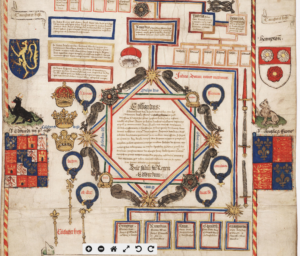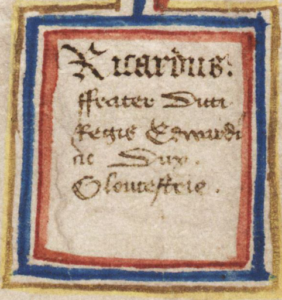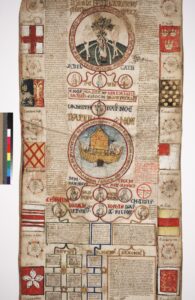Scholars Make Progress, Find Surprises, on Edward IV Roll Project.
Update on the Edward IV Roll Project: Earlier this year, the American Branch funded four scholars at the University of Pennsylvania to begin transcribing and translating Free Library of Philadelphia Lewis MS E201 – a long, multi-membrane propaganda scroll combining a chronicle of the history of the world from Creation with a genealogy of Edward IV, effectively marrying Biblical authority to the Yorkist claim to be the rightful kings of England.
Exceeding all expectations, the scholars at the University of Pennsylvania reported that they have been able to transcribe and translate half the scroll’s text with the first phase of funding! They are excited to tackle the remaining half with additional funding from the American Branch of the Richard III Society and a generous gift from one of its members.
Made to celebrate the king’s accession in 1461, MS E201 is replete with Yorkist heraldry and symbolism such as fetterlocks, shining suns, and white roses, as seen in the scroll’s bottom membrane (below) where the birth of Edward IV is recorded in a very splashy way. The colored lines forming boxes around Edward IV and his father show they are descended from the English and French royal lines, as well as the noble House of Mortimer, making this a piece of advocacy for the Yorkist title to the English crown:

Edward IV’s youngest brother, the future Richard III, gets a mention as “Ricardus: frater dicti Regie Edwardi ac Dux Gloucestrie” or “Richard: brother of the said King Edward and also Duke of Gloucester”.

Alongside the visual elements, the scroll has extensive prose and textual features written by medieval scribes in abbreviated Latin calligraphy. For anyone unfamiliar with Latin or paleography (the study of ancient writing systems), these areas are incomprehensible.

One of the first goals of the project is to make the text understandable by transcribing the handwriting, expanding any abbreviations, and translating all this into English. That, alone, will go very far in transforming how MS E201 is interpreted and viewed as a cultural object as well as a piece of Yorkist propaganda from the Wars of the Roses period.
After working closely with the document for many months, the graduate students are positively glowing with praise for the project.
“This has been my first big paleographical project, so my knowledge was limited coming in. With that being said, I’ve learned so much during the course of working with this manuscript,” writes Ph.D. candidate Ariel Bates. “The entire process feels quite a bit like detective work, but it is so rewarding when you are able to untangle the mysteries … I feel incredibly grateful to have been able to work on this material and have found it invaluable to my education as a medievalist.”
“I was hired to work on the Lewis Roll as a Latin translator,” writes Ph.D. candidate Emma Dyson, “but from the beginning, my role has been much more interesting than simply translating text.” Emma reports being flummoxed at first by some of the unusual and arcane mythological stories included in the text, especially a very-little known account of the origin for what is called England today. The origin story is a blockbuster and racy tale involving 50 sisters who assumed sovereignty over and plotted the murders of their husbands. After their scheme was revealed, they were banished from the kingdom and set adrift on a ship, ultimately finding themselves on the shores of an uninhabited land later called Albion after the first sister to have disembarked and set foot on the island – Albina. What follows is as shocking and unsettling as anything that was portrayed in the television series Game of Thrones, but for medieval readers, it was possibly a not-so-subtle attack on Henry VI’s queen, Margaret of Anjou, who dared to assume sovereignty over her husband during the last years of his reign.
Emma continues: “the experience has given me more than knowledge of a single text. Now, I have a real familiarity with medieval historiography and its way of bridging the biblical, the mythical, and the historical. I never would have guessed that studying a genealogy could be so rewarding.”
A full report on the work-to-date will be forthcoming in the December issue of the Ricardian Chronicle.
